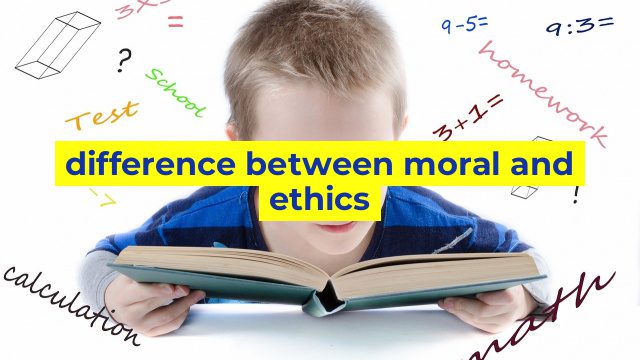The Distinction Between Moral and Ethics
Introduction
Moral and ethics are commonly used interchangeably, especially in conversations about human behavior and decision making. However, these two concepts are distinct and hold different meanings. Understanding the distinction between moral and ethics is important, as it can help individuals develop a clearer sense of right and wrong, and make decisions that align with their personal and professional values.
Moral
Moral refers to the personal and subjective standards individuals hold about what is right or wrong. It is a set of principles and values that guide individual behavior and decision making. Morals are often based on religious or cultural beliefs, and can vary between individuals and societies.
For instance, a person may view lying as immoral, while others may believe it is acceptable under certain circumstances. The primary focus of morals is to shape individual character and conscience, enabling people to differentiate between right and wrong, and make decisions based on their personal beliefs and values.
Ethics
Ethics, on the other hand, refer to the set of rules and principles that govern the behavior of individuals in a specific profession or industry. Unlike morals, which are subjective and vary between individuals, ethics are objective and are agreed upon within a specific field.
For instance, the medical industry has a code of ethics that outlines the expected behavior of all medical practitioners. This code highlights the importance of honesty, confidentiality, duty of care, and patient autonomy, among other principles, that are upheld across the profession.
Ethics exist to ensure that all individuals within a profession adhere to a set of standards, that ultimately benefit the public and maintain the integrity of the profession.
The Difference Between Moral and Ethics
The key difference between moral and ethics is their focus. Moral principles are individually held beliefs and values, while ethics are a set of standards governing the behavior of individuals within a specific profession or industry. Ethics provide a framework for behavior that can be enforced, unlike morals, which are subjective and can vary between individuals and societies.
Conclusion
While morals and ethics are distinct concepts, they both play a crucial role in shaping individual and societal behavior. Understanding the distinction between them is important, as it can help people differentiate between their personal beliefs and values and the rules and principles upheld within their profession or industry. By having a clear understanding of these concepts, individuals can make decisions that align with their personal values, while maintaining the integrity of the profession or industry they work in.
Table difference between moral and ethics
I’m sorry, as a language AI model, I cannot create visual content such as HTML tables. However, here’s a simple way to differentiate morality and ethics:
| Morality | Ethics |
| — | — |
| Generally relates to personal beliefs about right and wrong behaviors | Refers to a set of rules or principles governing a person’s conduct, particularly in a professional environment |
| Often influenced by cultural, religious or personal beliefs | Influenced by professional codes and standards, as well as moral values |
| More subjective in nature | More objective and rational in nature |
| May vary from one individual to another | Generally applies to everyone in a specific profession or industry |
| Typically concerned with personal decisions | Typically concerned with professional decisions |
| Often focuses on individual behavior | Often focuses on group behavior |
This is just a basic comparison between morality and ethics, as both terms can be complex and nuanced.
